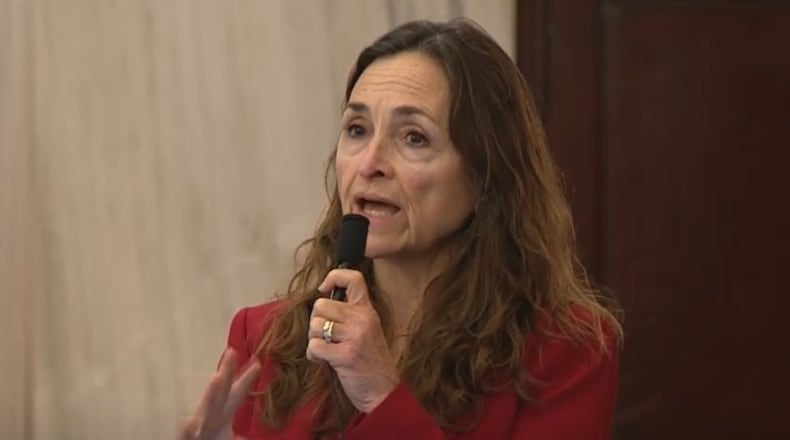“This bill was created by and with health care professionals, including our doctors, nurses, hospitals and law enforcement,” said state Rep. Andrea White, R-Kettering, who is sponsoring the bill, along with state Rep. Rachel Baker, D-Cincinnati.
“It’s really about having the back of our health care professionals who are increasingly being attacked in their work spaces and increasing the ability for them to speak into the process and work to try to stem this tide,” White said.
H.B. 452 would require hospitals to establish a security plan for preventing workplace violence and managing aggressive behaviors, along with a workplace violence incident reporting system.
“I consider this a win with our health care professionals and for Tristin,” said Ron Smith, father of Tristin Kate Smith, a Dayton nurse who died by suicide on Aug. 7, 2023. Smith, of Oakwood, has continued to advocate for safer working conditions for nurses after finding a letter Tristin had written about the strain the nursing profession had on her.
“The physical and emotional trauma of workplace violence is driving emergency nurses out of the profession,” said Jeannie Burnie in submitted testimony on behalf of the Ohio Emergency Nurses Association, which represents 167,000 emergency nurses.
About 800,000 registered nurses and 184,000 licensed practical nurses/vocational nurses — or 20% of each of those fields — indicated they are likely to leave nursing by 2027, according to the National Council of State Boards of Nursing’s 2022 National Nursing Workforce Study
“The full impact of workplace violence remains unclear, as many incidents go unreported,” Burnie said.
Nurses may choose not to report incidents because they feel unsupported by their employers or believe that no action will be taken against the perpetrator, she said.
“Even more alarming is the perception among many nurses that workplace violence is just a part of their job,” Burnie said. “Physical violence, intimidation, and threats are unacceptable in the workplace, and they should never be tolerated in the health care setting.”
Two amendments were added to H.B. 452 this week, including the addition of “trained security personnel” to the considerations that hospitals will make when creating guidelines for those who stay with a patient who has demonstrated violence or poses a risk to themselves or others.
“While the original bill language did not exclude trained security personnel, this amendment explicitly includes them,” said state Sen. Terry Johnson, R-McDermott, who chairs the Ohio Senate Veterans and Public Safety Committee.
The second amendment incorporated elements of Senate Bill 32, which passed the Ohio Senate in November.
“The amendment will grant civil immunity for certain injuries to a person who acts in self-defense or defense of another during the commission or imminent commission of a threat of violence to protect the members or guests of a nonprofit corporation under certain circumstances,” Johnson said.
The sponsors of the bill also approved of both the amendments.
“This legislation is a critical first step toward protecting Ohio’s nurses and health professionals from the violence they face daily while caring for others, however, our work is far from done,” said Rick Lucas, a nurse and president and executive director of the Ohio Nurses Association.
“While H.B. 452 now awaits Gov. DeWine’s signature, hospital executives continue to prioritize profits over patient care, creating unsafe conditions for employees and jeopardizing the lives of those they serve. Minimum staffing standards must be established and enforced in every hospital across Ohio,” said Lucas.
About the Author


